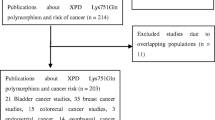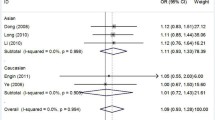Abstract
Xeroderma pigmentosum group A (XPA) participates in modulating recognition of DNA damage during the DNA nucleotide excision repair process. The XPA A23G polymorphism has been investigated in case–control studies to evaluate the cancer risk attributed to the variant, but the results were conflicting. To clarify the effect of XPA A23G polymorphism in cancer risk, we conducted a meta-analysis that included 30 published case–control studies. Overall, no significant association of XPA A23G variant with cancer susceptibility was observed for any genetic model. However, significant association was observed for colorectal cancer (GG vs. AA: OR = 1.68, 95% CI = 1.15–2.44; dominant genetic model GG + AG vs. AA: OR = 1.54, 95% CI = 1.08–1.17), for breast cancer an increased but non-significant risk was found (GG vs. AA: OR = 1.27, 95% CI = 0.98–1.66; dominant genetic model GG + AG vs. AA: OR = 1.27, 95% CI = 0.99–1.63), and for head and neck cancer an increased risk was observed in recessive model (OR = 1.19, 95% CI = 1.02–1.38), whereas for lung cancer a significant reduced risk was observed (GG vs. AA: OR = 0.77, 95% CI = 0.66–0.90; dominant genetic model GG + AG vs. AA: OR = 0.76, 95% CI = 0.66–0.87), it’s noting that in Asian population the inverse association was more apparent. In addition, in Asian population for esophageal cancer a significant decreased risk was also found in dominant genetic model (OR = 0.55; 95% CI = 0.43–0.70) and for head and neck cancer an increased risk was observed in dominant genetic model (OR = 1.51, 95% CI = 1.03–2.23). The meta-analysis suggested that the XPA A23G G allele is a low-penetrant risk factor for cancer development.


Similar content being viewed by others
Abbreviations
- XPA:
-
Xeroderma pigmentosum group A
- NER:
-
Nucleotide excision repair
- HWE:
-
Hardy–Weinberg equilibrium
- PCR-RFLP:
-
Polymerase chain reaction-restriction fragment length polymorphism
- SCC:
-
Squamous cell carcinoma; BCC, Basal cell carcinoma
References
Sancar A, Lindsey-Boltz LA, Unsal-Kacmaz K, Linn S (2004) Molecular mechanisms of mammalian DNA repair and the DNA damage checkpoints. Annu Rev Biochem 73:39–85. doi:10.1146/annurev.biochem.73.011303.073723
Mohrenweiser HW, Wilson DM 3rd, Jones IM (2003) Challenges and complexities in estimating both the functional impact and the disease risk associated with the extensive genetic variation in human DNA repair genes. Mutat Res 526(1–2):93–125
Batty DP, Wood RD (2000) Damage recognition in nucleotide excision repair of DNA. Gene 241(2):193–204
Wu X, Zhao H, Wei Q, Amos CI, Zhang K, Guo Z, Qiao Y, Hong WK, Spitz MR (2003) XPA polymorphism associated with reduced lung cancer risk and a modulating effect on nucleotide excision repair capacity. Carcinogenesis 24(3):505–509
Volker M, Mone MJ, Karmakar P, van Hoffen A, Schul W, Vermeulen W, Hoeijmakers JH, van Driel R, van Zeeland AA, Mullenders LH (2001) Sequential assembly of the nucleotide excision repair factors in vivo. Mol Cell 8(1):213–224
de Laat WL, Jaspers NG, Hoeijmakers JH (1999) Molecular mechanism of nucleotide excision repair. Genes Dev 13(7):768–785
Park JY, Park SH, Choi JE, Lee SY, Jeon HS, Cha SI, Kim CH, Park JH, Kam S, Park RW, Kim IS, Jung TH (2002) Polymorphisms of the DNA repair gene xeroderma pigmentosum group A and risk of primary lung cancer. Cancer Epidemiol Biomarkers Prev 11(10):993–997
Butkiewicz D, Popanda O, Risch A, Edler L, Dienemann H, Schulz V, Kayser K, Drings P, Bartsch H, Schmezer P (2004) Association between the risk for lung adenocarcinoma and a (−4) G-to-A polymorphism in the XPA gene. Cancer Epidemiol Biomarkers Prev 13(12):2242–2246
Vogel U, Overvad K, Wallin H, Tjonneland A, Nexo BA, Raaschou-Nielsen O (2005) Combinations of polymorphisms in XPD, XPC and XPA in relation to risk of lung cancer. Cancer Lett 222(1):67–74. doi:10.1016/j.canlet.2004.11.016
Zienolddiny S, Campa D, Lind H, Ryberg D, Skaug V, Stangeland L, Phillips DH, Canzian F, Haugen A (2006) Polymorphisms of DNA repair genes and risk of non-small cell lung cancer. Carcinogenesis 27(3):560–567. doi:10.1093/carcin/bgi232
De Ruyck K, Szaumkessel M, De Rudder I, Dehoorne A, Vral A, Claes K, Velghe A, Van Meerbeeck J, Thierens H (2007) Polymorphisms in base-excision repair and nucleotide-excision repair genes in relation to lung cancer risk. Mutat Res 631(2):101–110. doi:10.1016/j.mrgentox.2007.03.010
Raaschou-Nielsen O, Sorensen M, Overvad K, Tjonneland A, Vogel U (2008) Polymorphisms in nucleotide excision repair genes, smoking and intake of fruit and vegetables in relation to lung cancer. Lung Cancer 59(2):171–179. doi:10.1016/j.lungcan.2007.08.018
Qian B, Zhang H, Zhang L, Zhou X, Yu H, Chen K (2011) Association of genetic polymorphisms in DNA repair pathway genes with non-small cell lung cancer risk. Lung Cancer 73(2):138–146. doi:10.1016/j.lungcan.2010.11.018
Sugimura T, Kumimoto H, Tohnai I, Fukui T, Matsuo K, Tsurusako S, Mitsudo K, Ueda M, Tajima K, Ishizaki K (2006) Gene-environment interaction involved in oral carcinogenesis: molecular epidemiological study for metabolic and DNA repair gene polymorphisms. J Oral Pathol Med 35(1):11–18. doi:10.1111/j.1600-0714.2005.00364.x
Bau DT, Tsai MH, Huang CY, Lee CC, Tseng HC, Lo YL, Tsai Y, Tsai FJ (2007) Relationship between polymorphisms of nucleotide excision repair genes and oral cancer risk in Taiwan: evidence for modification of smoking habit. Chin J Physiol 50(6):294–300
Abbasi R, Ramroth H, Becher H, Dietz A, Schmezer P, Popanda O (2009) Laryngeal cancer risk associated with smoking and alcohol consumption is modified by genetic polymorphisms in ERCC5, ERCC6 and RAD23B but not by polymorphisms in five other nucleotide excision repair genes. Int J Cancer 125(6):1431–1439. doi:10.1002/ijc.24442
Jelonek K, Gdowicz-Klosok A, Pietrowska M, Borkowska M, Korfanty J, Rzeszowska-Wolny J, Widlak P (2010) Association between single-nucleotide polymorphisms of selected genes involved in the response to DNA damage and risk of colon, head and neck, and breast cancers in a Polish population. J Appl Genet 51(3):343–352. doi:10.1007/BF03208865
Gil J, Ramsey D, Stembalska A, Karpinski P, Pesz KA, Laczmanska I, Leszczynski P, Grzebieniak Z, Sasiadek MM (2011) The C/A polymorphism in intron 11 of the XPC gene plays a crucial role in the modulation of an individual’s susceptibility to sporadic colorectal cancer. Mol Biol Rep. doi:10.1007/s11033-011-0767-5
Feng XX, Duan PF, Wang LB, Zhang JB, Lu ZX (2008) Study on the relationship between polymorphisms of XPA gene and susceptibility of esophageal cancer. Zhonghua Liu Xing Bing Xue Za Zhi 29(9):930–933
Guo W, Zhou RM, Wan LL, Wang N, Li Y, Zhang XJ, Dong XJ (2008) Polymorphisms of the DNA repair gene xeroderma pigmentosum groups A and C and risk of esophageal squamous cell carcinoma in a population of high incidence region of North China. J Cancer Res Clin Oncol 134(2):263–270. doi:10.1007/s00432-007-0283-0
Pan J, Lin J, Izzo JG, Liu Y, Xing J, Huang M, Ajani JA, Wu X (2009) Genetic susceptibility to esophageal cancer: the role of the nucleotide excision repair pathway. Carcinogenesis 30(5):785–792. doi:10.1093/carcin/bgp058
Crew KD, Gammon MD, Terry MB, Zhang FF, Zablotska LB, Agrawal M, Shen J, Long CM, Eng SM, Sagiv SK, Teitelbaum SL, Neugut AI, Santella RM (2007) Polymorphisms in nucleotide excision repair genes, polycyclic aromatic hydrocarbon-DNA adducts, and breast cancer risk. Cancer Epidemiol Biomarkers Prev 16(10):2033–2041. doi:10.1158/1055-9965.EPI-07-0096
Dong Z, Guo W, Zhou R, Wan L, Li Y, Wang N, Kuang G, Wang S (2008) Polymorphisms of the DNA repair gene XPA and XPC and its correlation with gastric cardiac adenocarcinoma in a high incidence population in North China. J Clin Gastroenterol 42(8):910–915. doi:10.1097/MCG.0b013e3180f6262c
Palli D, Polidoro S, D’Errico M, Saieva C, Guarrera S, Calcagnile AS, Sera F, Allione A, Gemma S, Zanna I, Filomena A, Testai E, Caini S, Moretti R, Gomez-Miguel MJ, Nesi G, Luzzi I, Ottini L, Masala G, Matullo G, Dogliotti E (2010) Polymorphic DNA repair and metabolic genes: a multigenic study on gastric cancer. Mutagenesis 25(6):569–575. doi:10.1093/mutage/geq042
Miller KL, Karagas MR, Kraft P, Hunter DJ, Catalano PJ, Byler SH, Nelson HH (2006) XPA, haplotypes, and risk of basal and squamous cell carcinoma. Carcinogenesis 27(8):1670–1675. doi:10.1093/carcin/bgi376
Lin J, Pu X, Wang W, Matin S, Tannir NM, Wood CG, Wu X (2008) Case–control analysis of nucleotide excision repair pathway and the risk of renal cell carcinoma. Carcinogenesis 29(11):2112–2119. doi:10.1093/carcin/bgn189
Hansen RD, Sorensen M, Tjonneland A, Overvad K, Wallin H, Raaschou-Nielsen O, Vogel U (2007) XPA A23G, XPC Lys939Gln, XPD Lys751Gln and XPD Asp312Asn polymorphisms, interactions with smoking, alcohol and dietary factors, and risk of colorectal cancer. Mutat Res 619(1–2):68–80. doi:10.1016/j.mrfmmm.2007.02.002
Weiss JM, Weiss NS, Ulrich CM, Doherty JA, Voigt LF, Chen C (2005) Interindividual variation in nucleotide excision repair genes and risk of endometrial cancer. Cancer Epidemiol Biomarkers Prev 14(11 Pt 1):2524–2530. doi:10.1158/1055-9965.EPI-05-0414
Hall J, Hashibe M, Boffetta P, Gaborieau V, Moullan N, Chabrier A, Zaridze D, Shangina O, Szeszenia-Dabrowska N, Mates D, Janout V, Fabianova E, Holcatova I, Hung RJ, McKay J, Canzian F, Brennan P (2006) The association of sequence variants in DNA repair and cell cycle genes with cancers of the upper aerodigestive tract. Carcinogenesis 28(3):665–671. doi:10.1093/carcin/bgl160
Zintzaras E, Lau J (2008) Synthesis of genetic association studies for pertinent gene-disease associations requires appropriate methodological and statistical approaches. J Clin Epidemiol 61(7):634–645. doi:10.1016/j.jclinepi.2007.12.011
Zintzaras E, Ioannidis JP (2005) Heterogeneity testing in meta-analysis of genome searches. Genet Epidemiol 28(2):123–137. doi:10.1002/gepi.20048
DerSimonian R, Laird N (1986) Meta-analysis in clinical trials. Control Clin Trials 7(3):177–188
Macaskill P, Walter SD, Irwig L (2001) A comparison of methods to detect publication bias in meta-analysis. Stat Med 20(4):641–654. doi:10.1002/sim.698
Yang F, Shi JY, Xu L, Ren LJ, Zhang QH, Zhao WL, Shen ZX (2009) Genetic susceptibility of single nucleotide polymorphism in MGMT to non-Hodgkin lymphoma. Zhonghua Xue Ye Xue Za Zhi 30(9):622–625
Joshi AD, Corral R, Siegmund KD, Haile RW, Le Marchand L, Martinez ME, Ahnen DJ, Sandler RS, Lance P, Stern MC (2009) Red meat and poultry intake, polymorphisms in the nucleotide excision repair and mismatch repair pathways and colorectal cancer risk. Carcinogenesis 30(3):472–479. doi:10.1093/carcin/bgn260
Shen J, Desai M, Agrawal M, Kennedy DO, Senie RT, Santella RM, Terry MB (2006) Polymorphisms in nucleotide excision repair genes and DNA repair capacity phenotype in sisters discordant for breast cancer. Cancer Epidemiol Biomarkers Prev 15(9):1614–1619. doi:10.1158/1055-9965.EPI-06-0218
Duell EJ, Bracci PM, Moore JH, Burk RD, Kelsey KT, Holly EA (2008) Detecting pathway-based gene-gene and gene-environment interactions in pancreatic cancer. Cancer Epidemiol Biomarkers Prev 17(6):1470–1479. doi:10.1158/1055-9965.EPI-07-2797
Ma WJ, Lv GD, Zheng ST, Huang CG, Liu Q, Wang X, Lin RY, Sheyhidin I, Lu XM (2010) DNA polymorphism and risk of esophageal squamous cell carcinoma in a population of North Xinjiang, China. World J Gastroenterol 16(5):641–647
Popanda O, Schattenberg T, Phong CT, Butkiewicz D, Risch A, Edler L, Kayser K, Dienemann H, Schulz V, Drings P, Bartsch H, Schmezer P (2004) Specific combinations of DNA repair gene variants and increased risk for non-small cell lung cancer. Carcinogenesis 25(12):2433–2441. doi:10.1093/carcin/bgh264
Applebaum KM, Karagas MR, Hunter DJ, Catalano PJ, Byler SH, Morris S, Nelson HH (2007) Polymorphisms in nucleotide excision repair genes, arsenic exposure, and non-melanoma skin cancer in New Hampshire. Environ Health Perspect 115(8):1231–1236. doi:10.1289/ehp.10096
Weiss JM, Weiss NS, Ulrich CM, Doherty JA, Chen C (2006) Nucleotide excision repair genotype and the incidence of endometrial cancer: effect of other risk factors on the association. Gynecol Oncol 103(3):891–896. doi:10.1016/j.ygyno.2006.05.020
Hirschhorn JN, Lohmueller K, Byrne E, Hirschhorn K (2002) A comprehensive review of genetic association studies. Genet Med 4(2):45–61
Acknowledgments
The work was supported in part by the National Natural Science Foundation of China (No. 30772411).
Conflict of Interest
None declared.
Author information
Authors and Affiliations
Corresponding author
Additional information
Jun Liu, Zhen Zhang and Xiao-Lin Cao have contributed equally to this work.
Rights and permissions
About this article
Cite this article
Liu, J., Zhang, Z., Cao, XL. et al. XPA A23G polymorphism and susceptibility to cancer: a meta-analysis. Mol Biol Rep 39, 6791–6799 (2012). https://doi.org/10.1007/s11033-012-1504-4
Received:
Accepted:
Published:
Issue Date:
DOI: https://doi.org/10.1007/s11033-012-1504-4




